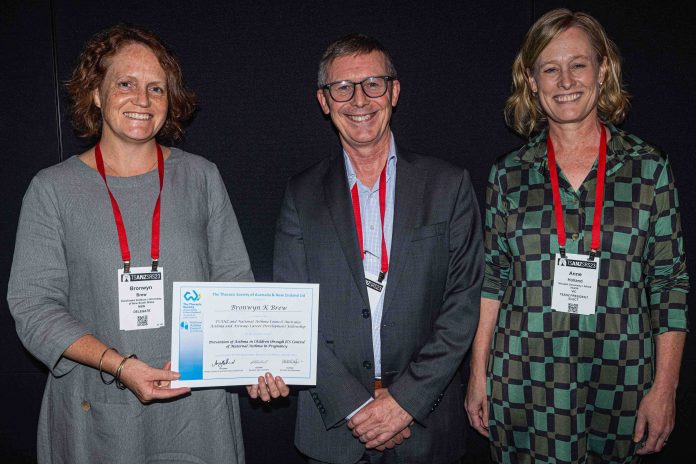Dr Bronwyn Brew, Senior Research Fellow at the National Perinatal Epidemiology and Statistics Unit at the Centre for Big Data Research in Health (CBDRH) and School of Clinical Medicine, Discipline of Women’s Health, UNSW has been awarded the 2023 Asthma and Airways Career Development Fellowship.
Jointly funded by the National Asthma Council Australia (NAC) and the Thoracic Society of Australia and New Zealand (TSANZ), the Fellowship will enable Dr Brew to develop her research into the prevention of asthma in children through inhaled corticosteroids (ICS) control of maternal asthma in pregnancy.
“With this project, I would like to investigate the possibility that regular ICS use in pregnancy in women with asthma will actually help to prevent the development of asthma in their children,” says Dr Brew.
“In addition, I want to investigate if women without maternal exacerbations (hospital or emergency, period of breathlessness) are also less likely to have children with asthma.”
Dr Brew says that both these results together would suggest that better asthma control in pregnancy has the potential to not only improve perinatal outcomes and maternal health but may reduce asthma in children.
“Despite studies showing that ICS use by women at the start of pregnancy, mid-pregnancy and/or the end of pregnancy was strongly associated with a lower risk of asthma, wheezing and use of SABA in children aged 4-6 years, there has been a lack of research to confirm these results,” says Dr Brew.
“Most research in maternal asthma focuses on the perinatal period without follow-up to childhood, so my research will aim to answer whether asthma control exhibited by regular ICS use and a lack of exacerbations may reduce asthma onset in children.”
Dr Brew plans to conduct an observational replication study using population-wide linked health data of pregnant women with asthma and their offspring in both Australia and Sweden.
She says that the public health significance of this finding is important for respiratory health, not only for the management of asthma in pregnant women but to improve population asthma rates.
“If we find that regular ICS use in pregnancy and prevention of maternal exacerbations will reduce asthma in children, the plan is to verify this with different study designs and ultimately attempt to explain the mechanistic pathway to child asthma,” says Dr Brew.
About the Fellowship
The Fellowship was established to enable mid-career investigators to establish themselves as independent, self-directed researchers and foster the development of research in respiratory medicine in Australia and New Zealand.
The Fellowship is for one year and is jointly funded by the National Asthma Council Australia and the Thoracic Society of Australia and New Zealand to the value of $60,000.
NAC CEO Rhonda Cleveland says they were pleased to contribute to Dr Brew’s research and proud to assist with the career development of an emerging respiratory expert.
“Supporting the Asthma and Airways Career Development Fellowship aligns perfectly with the National Asthma Council Australia’s commitment to building capacity and knowledge within the research and clinical community and mission to improve Australia’s capabilities to help people with asthma to breathe well by facilitating best-practice care,” says Ms Cleveland.
“It is also a way to give thanks for the generous support of many respiratory experts who provide their expertise in the development of the National Asthma Council Australia resources and educational programs.”
TSANZ President Professor Anne Holland says “Granting mid-level funding to mid-career researchers provides critical support for knowledge generation, developing leadership, and fostering research teams”.
“We are committed to building capacity in the respiratory workforce and increasing investment in lung health,” she says.
TSANZ CEO Vincent So adds that this Fellowship is another step forward in preventing disease, curing and providing relief from respiratory illness.
“TSANZ is pleased to work with NAC as partners on this fellowship to enhance funding for respiratory research and support the important work of our members,” he says.










